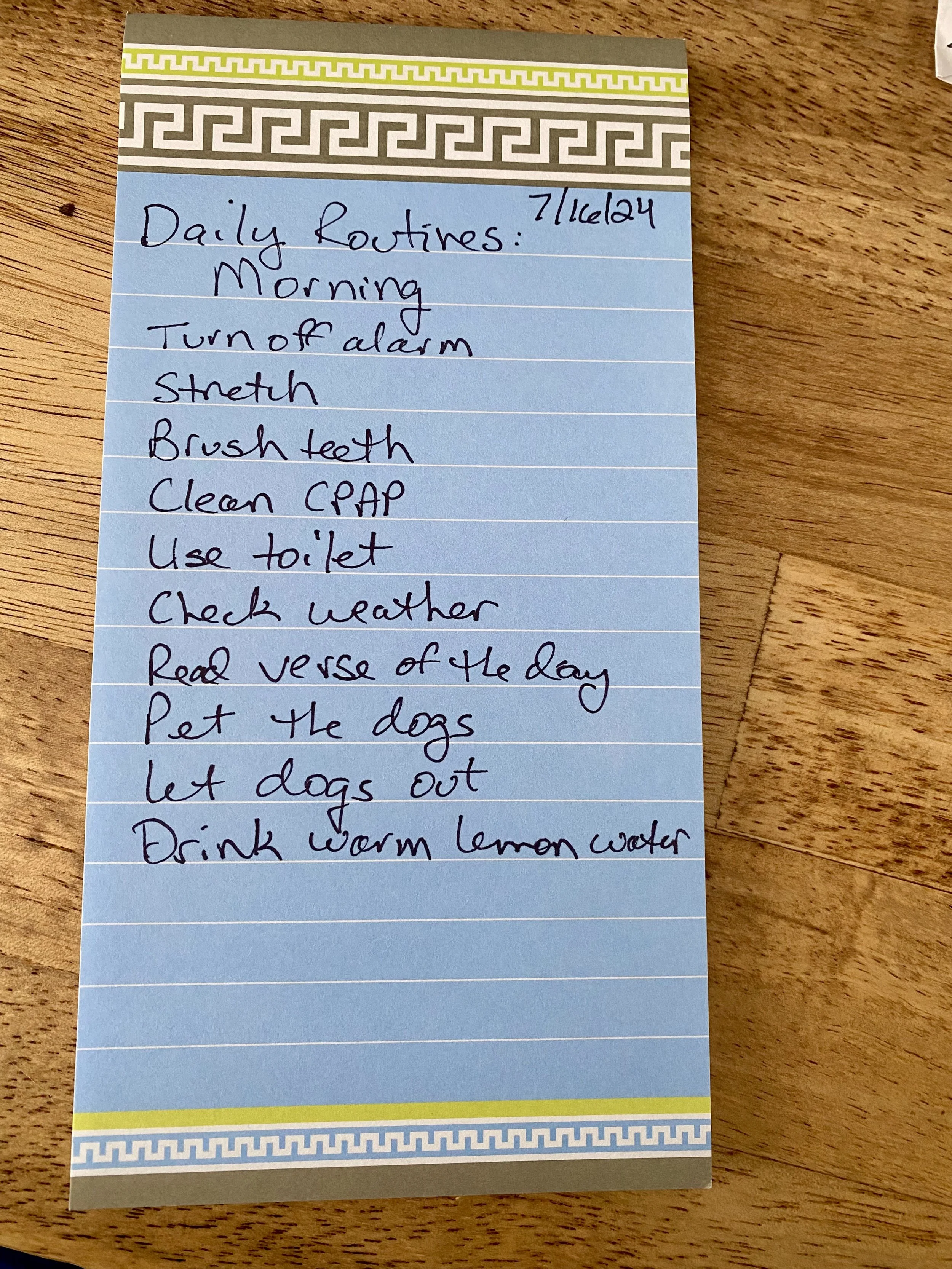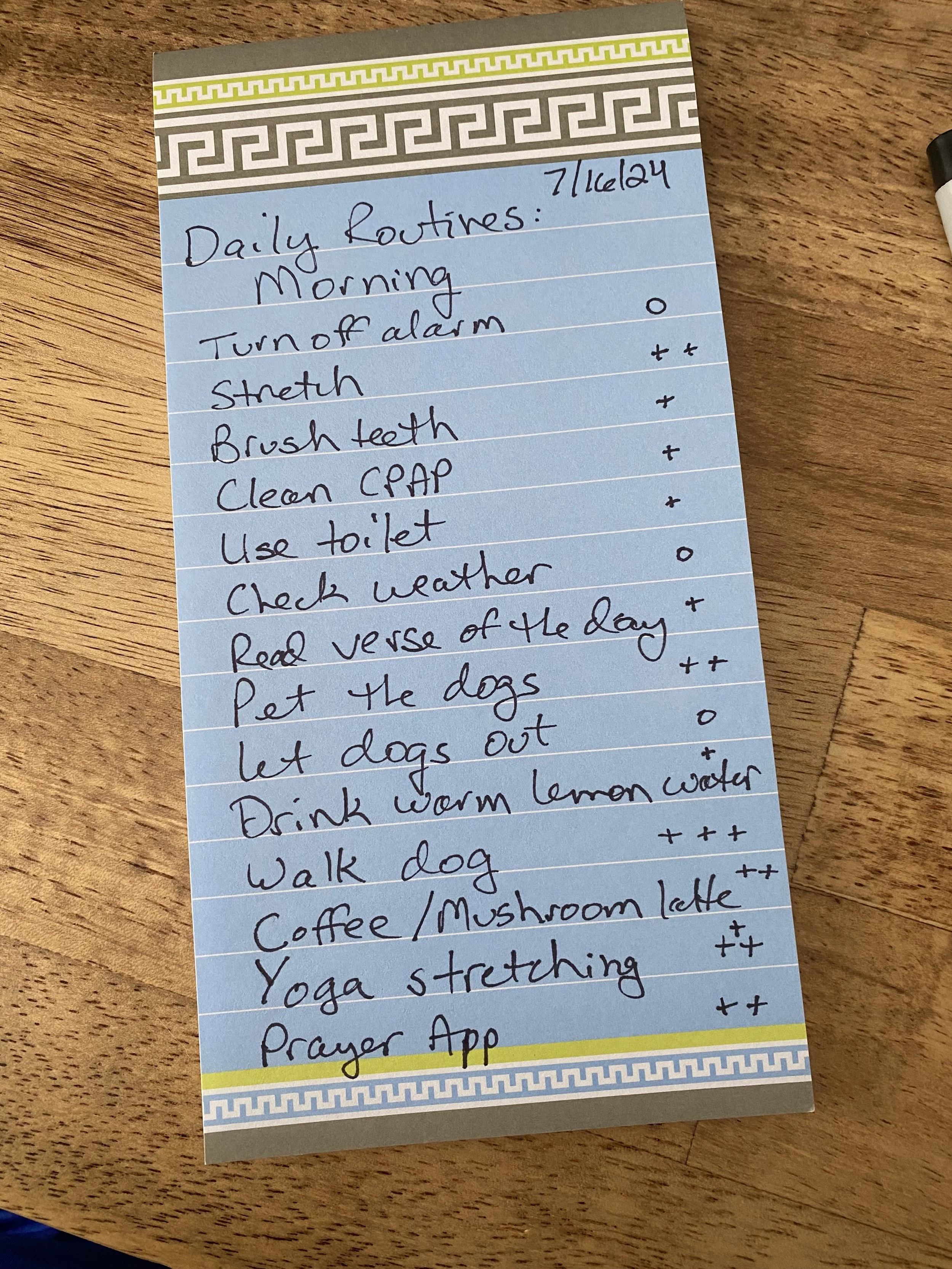Daily Habits: Supportive or Draining
Our daily habits are key to creating a thriving life. Habits or routines can be beneficial by decreasing decision fatigue, potentially allowing one to be more present in important relationships. Certain physical tasks, like fastening your seatbelt or locking your door support your safety. Routines may also help us to be more efficient.
Many of our daily routines are such deep rooted habits, we don't even think about what we are actually doing. This autopilot can be helpful if our habits are supporting our health, but it is detrimental if they are undermining our wellness. One cup of coffee becomes the whole pot or a sugar laden jumbo cup of highly processed colors and flavors. Those subtle shifts can be reversed, but first you need to identify them.
Make a simple list of your morning routine activities.
No judgement, just write it down.
Assess your current habits
Today is a good day to review and assess your daily routines with an eye to truly cultivating habits for Health and Wellbeing. Reassessing our daily habits can be helpful when we feel stuck in life. Natural times of change can also invite us to a time of reflection; seasonal changes or a new job, new medical diagnosis, or other life changing event.
The first step is to take a few minutes to reflect on our morning routine. Grab a piece of paper or open a note on your device. Don’t over think your list, just jot down your typical morning routine. Spend a little more time thinking about the subconscious things you do or say to yourself.
Body Care/ Physical Health:
Brush teeth
Exercise / Activities (Walk, bike, run, go to the gym, yoga, etc.)
Wash face / shower (skin care routine)
Coffee / tea
Breakfast (protein, whole grains, fruits, veggies, carbs, healthy fats, sugar)
Supplements
Mind / Spirit practices:
Gratitude
Connections (in person vs social media)
Meditation / Prayer / Grounding / Breathing
Read / watch / listen (news, music, podcast, etc.)
Time alone vs time with others, or pets
Rate each activity
+ / - / 0
Use ++ or +++ for activities that support more than one aspect of your health.
“Walk dog” gets 3 +++ as I am getting exercise, I am out in nature, observing colors, textures, sensations (temperature, breeze), sunlight, etc.
Rating impact positive or negative
Now that you have a list, let’s take a few minutes to rate each task. To keep this simple, just mark each item as positive (+) or negative (-) or neutral (0); feel free to use double or triple signs to indicate which items are more or less beneficial. Consider activities that may support or hinder more than one aspect of your health (i.e. walking with partner or friends supports physical health and emotional / relational health vs watching hours of news programs hearing negative stories that increase anxiety or despair).
Tally up your list. How did you do? Are your habits overall positive or negative? Consider what to do with habits that are draining or discouraging, rather than nourishing or encouraging. Can you drop it from your morning routine? Or at least decrease the time and energy you give it?
Habits that have shifted
Are there any habits that started out positive and have become negative? Maybe one cup of coffee has become a whole pot, or it’s become a little coffee with extra sugar, added flavors and highly processed fats. Did your workout schedule start out reasonable and now it’s pushing you too hard? Our body needs rest between workouts. Inadequate recovery can lead to injury and/ or increased stress hormones rather than decreased stress. Or maybe you used to work out, but keep hitting snooze instead of going to the gym.
Don’t panic! Now you know if your morning routine is setting you up for success or exhaustion. Today is about pausing to assess what is nourishing your health and what may actually be eroding it. Making gradual habit shifts are more likely to lead to lasting lifestyle changes. Forcing ourselves to make drastic changes adds more stress to our lives, exactly the opposite of what we need. What can we do?
Check for the basics
Key points to have in your morning routines:
Adequate hydration (water)
Movement / physical activity (consider varying activities and intensities)
Mental self care meditation or prayer for positive mindset and limit time on news or social media
Relationship supporting practices (positive connection to self, others, and/or a higher power)
Easy positive additions
Healthy Habit Hacks:
Smile at yourself in the mirror
Say something positive and true about yourself
Look for beauty daily (sunrise, trees, flowers, a smile, sparkle in a snowflake, etc.)
Take a moment to pause and just notice your breath, the movement of your chest, the air passing in and out of your nose
We are each unique human beings. We share basic needs for water, food, shelter, safety and relationships (love and belonging). What meets your needs in a nourishing manner may not work for your significant other or family member. The habits developed in your 20’s need to be revised in your 30’s and beyond. Our needs change over time and in different seasons of the year as well as seasons of life. Show yourself some love and compassion by modifying your morning routine to set you up for a great day and a better tomorrow.


